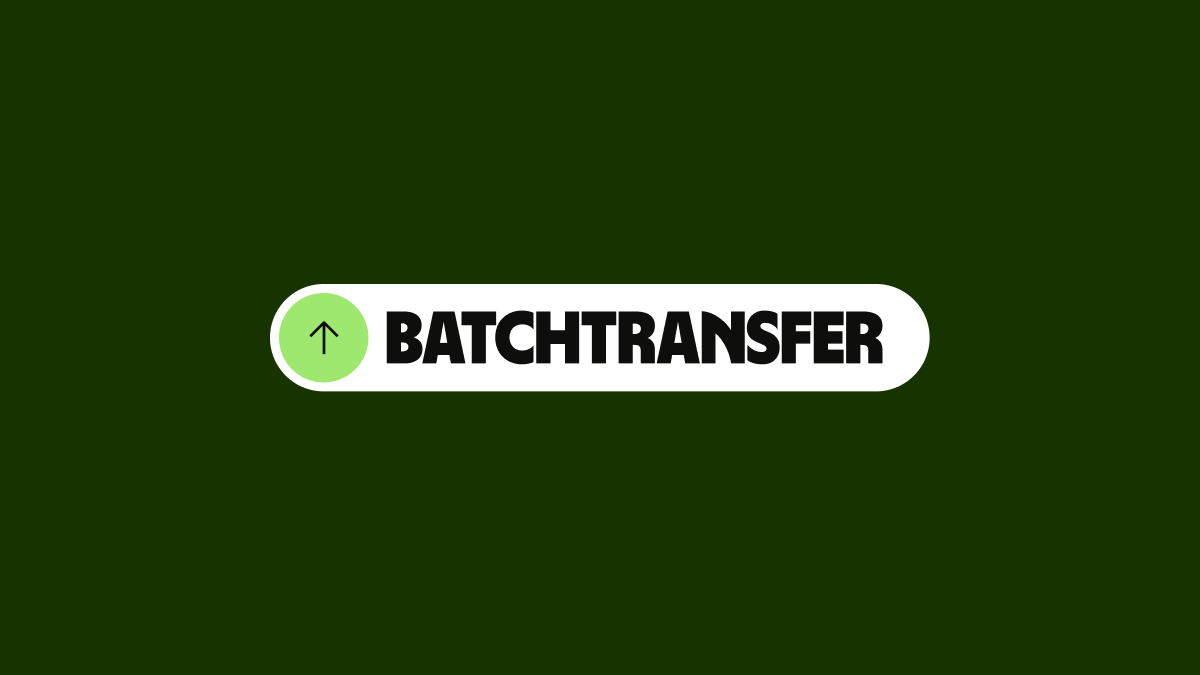How Does ACH Payroll Work? Benefits | Drawbacks
Learn how ACH payroll transfers funds electronically, plus its main benefits and drawbacks for modern payroll operations.

Belgium may be small in size, but its payroll system is among the most detailed and heavily regulated in Europe. Home to three official languages and distinct regional governments, Belgium adds administrative complexity to every step of payroll, from registering with tax authorities to issuing salary payments and calculating social security contributions. Once properly set up, the Belgian payroll infrastructure is also one of the most reliable and worker-protective in the world.
This guide walks through the key elements of the system, such as salary payments, payroll taxes, social security contributions, employee benefits and more, so you can confidently build and manage your Belgian workforce. We'll also talk about how BatchTransfer can help your team do international payroll.
The foundation of payroll compliance in Belgium lies in the employment contract. Every employee must have a written agreement specifying terms such as salary, work hours, job description and location. Belgium recognizes permanent, fixed-term and temporary contracts, with strict rules governing each.
Before any employment begins, the employer must register with the National Social Security Office (NSSO)1 and inform the appropriate tax authorities. In most cases, payroll processing also requires registration with a Joint Labour Committee (JLC),2 which defines sector-specific wage and benefit requirements.
Due to the country’s linguistic and regional diversity, employers must ensure documents and communications comply with local language laws: Dutch in Flanders, French in Wallonia and bilingual Dutch-French in Brussels.
Before processing salary payments or hiring employees, every employer must complete a series of registrations to comply with Belgium’s payroll and tax systems. Here’s how to get started:
All Belgian employers need an enterprise number. This is issued by the Crossroads Bank for Enterprises (CBE)3 and serves as your official company ID for tax, social security and employment purposes. Foreign companies must either set up a Belgian legal entity or appoint a local representative to complete this registration.
Next, you must register your business with the NSSO.4 This allows you to begin declaring social security contributions for employees. The NSSO manages healthcare, pension, unemployment and family allowance systems, all funded through payroll deductions.
The DIMONA system (Déclaration Immédiate / Onmiddellijke Aangifte)5 is a mandatory digital tool used to notify authorities each time an employee is hired or leaves. Employers must submit a DIMONA declaration on or before the first working day. Registration is done through the NSSO portal.
Every employer in Belgium must be affiliated with a JLC that defines the minimum wage, working conditions, and sector-specific rules. Registering under the correct JLC ensures you apply the right employment standards and avoid penalties or back pay claims.
You must also register with the Belgian tax administration to set up wage withholding for income tax. Employers are responsible for deducting the correct amount of tax from each salary and submitting monthly declarations to the tax office.
Once registration is complete, you’ll need a reliable way to calculate salary payments, withhold taxes, and file reports. Many employers choose local payroll providers or Employer of Record (EOR)6 services to manage this complexity and ensure compliance.
BatchTransfer has an easy-to-use instant payments system that allows you to make multiple payments, for both domestic and international, in one go. Small businesses and enterprises can get access to BatchTransfer with no additional cost after getting a Wise Business account.
BatchTransfer’s core strengths for payroll:
What sets BatchTransfer apart is its commitment to providing the mid-market rate for currency conversions. This means that businesses get a fair and transparent deal when making international payments.
Another perk of using BatchTransfer for international payroll is its extensive coverage of over countries and currencies! With features like automatic payment scheduling and API integration, small businesses can streamline their payroll process, freeing up valuable time and resources for other important tasks.
How can businesses use BatchTransfer for payroll?: Businesses can send up to 1000 payments with a single click with BatchTransfer. US-based business can access BatchTransfer at no extra charge.
Connect to your accounting software: You can easily manage and reconcile your mass payments through accounting software integrations such as QuickBooks or Xero.
Start making payments
with BatchTransfer >>
| Wise Features | Price |
|---|---|
|
|
Payroll in Belgium follows a standard monthly schedule, with salary payments typically made on the last working day of each month. Employers are required to issue a payslip for each payment, which must detail gross earnings, net pay, taxes withheld, social security contributions, working hours and any bonuses or reimbursements.
All salary payments must be made via bank transfer as cash payments are not permitted. It’s also mandatory to maintain detailed payroll records for each employee and to file monthly declarations to the NSSO.
Belgium doesn’t use a single universal minimum wage across all jobs. Instead, each Joint Labour Committee (JLC) sets its own minimums based on industry, job type, and seniority. However, there is a national baseline called the Guaranteed Average Minimum Monthly Income (GAMMI) that applies when no sector-specific rate exists.
As of February 1, 2025, the GAMMI is €2,111.89 gross per month for full-time employees aged 21 or older with at least one year of seniority.7 Lower thresholds apply to younger workers and new hires, but the full rate is the most common reference. This amount is adjusted periodically to reflect inflation and cost-of-living increases.
In most sectors, collective labour agreements require employers to pay more than the GAMMI. Failing to meet the applicable JLC wage standard can result in fines or mandatory back payments.
In addition to base pay, employers must also account for required bonuses and supplements. A 13th-month bonus is mandatory in many sectors and typically paid in December. Holiday pay, equal to about 92% of one month’s salary for white-collar employees, is usually paid in May or June. Overtime must be paid at 150% for extra hours on weekdays and Saturdays, and 200% on Sundays or public holidays, unless replaced with compensatory time off.
Belgium imposes some of the highest payroll taxes in Europe. Employers must calculate and withhold both income tax and social security contributions from each salary payment.
The employer is responsible for remitting these payments to the NSSO and ensuring all amounts are properly declared to the tax authorities.
In addition to national income tax, employees must pay local municipal taxes, which can add 7% to 9% on top of their personal tax burden. Employers must also be aware of regional tax incentives or levies, which may apply based on location.
Hiring in Belgium is expensive. Employers must factor in mandatory social security contributions, payroll taxes, and employee benefits, all of which significantly increase the total cost of employment.
Employer social security contributions usually range from 25% to 35% of gross salary, depending on the sector and company profile. On top of that, most employees are entitled to a 13th-month bonus, holiday pay, and other benefits like meal vouchers or group insurance.
For example, if you offer a gross monthly salary of €3,000, your real monthly cost could reach between €4,050 and €4,500 once all required charges are included. That figure includes employer contributions, prorated holiday pay and common non-wage benefits.
If you terminate an employee, additional costs like notice pay or severance may apply, depending on the employment contract and collective labour agreements.
Belgian law requires employers to issue a detailed payslip with every salary payment. Each payslip must clearly show the gross and net salary, all payroll taxes withheld, social security contributions, hours worked and any taxable or non-taxable employee benefits. Missing or incorrect information can lead to compliance issues.
On top of this, employers must submit a monthly DMFA (Déclaration Multifonctionnelle / Multifunctional Declaration)8 to the National Social Security Office. This report includes all employment and salary data for the period, including tax and contribution amounts. The deadline is fixed, and mistakes or late submissions can result in fines and retroactive audits. To avoid penalties, most employers use payroll software or hire local providers to handle these tasks accurately.
Payroll in Belgium is closely linked to a strong system of employee benefits. Some benefits are required by law, while others are optional but widely expected. Ignoring either can put employers at a disadvantage when it comes to attracting and retaining staff.
Statutory Leave Includes:
In addition to statutory leave, employees in Belgium often receive non-wage benefits that are either tax-advantaged or partially exempt from payroll taxes. These commonly include meal vouchers, eco vouchers, commuter travel allowances and homeworking allowances. Many companies also offer group insurance plans that include pension top-ups or hospitalization coverage. While not mandatory, these benefits have become standard in competitive hiring and are a key part of overall compensation.
Payroll in Belgium is complex. With three governments — Flanders, Wallonia and Brussels — each with its own official language and administrative systems, employers must navigate rules that can vary by location. This includes differences in employment regulations, tax rates, and reporting procedures.
Some filings must be submitted in the official language of the region where the employee works: Dutch in Flanders, French in Wallonia or both in Brussels. Submitting documents in the wrong language or to the wrong authority can cause delays, rejections or even fines.
In addition, all payroll-related data must be handled in line with the General Data Protection Regulation (GDPR). This includes storing and processing sensitive employee data, such as employment contracts, payslips and social security information. Non-compliance with GDPR can lead to serious legal and financial consequences, making it essential for employers to have proper data handling protocols in place across all regions.
Due to the sheer volume of compliance obligations, many businesses choose to outsource payroll in Belgium. Local payroll providers, or global Employer of Record (EOR) services, manage everything from drafting employment contracts and processing salary payments to filing payroll taxes and communicating with the NSSO.
Outsourcing can also reduce risk, especially for foreign employers unfamiliar with Belgian labour law or operating across multiple JLCs.
Revised salary thresholds for non‑EU work permits now require higher minimum pay for foreign hires under the Single Permit and work permit B schemes. These updates aim to ensure fair wages and proper social security contributions. Companies hiring non-EU talent must now factor payroll compliance directly into their immigration process.
Sick leave rules have also tightened. Employers must pay full wages during the first 30 days of certified sick leave. After that, the national social security office covers 60%. While the 60% rate isn’t new, enforcement is stricter, and employers must now submit medical documentation digitally within 14 days. Late or missing files may result in penalties or delayed reimbursements.
The NSSO has also launched a pilot for simplified payroll reporting. The new quarterly system merges multiple declarations into one online portal. Early users report fewer errors and less admin work, but adoption remains voluntary through 2026.
These updates highlight the need for regular contact with tax authorities and the NSSO. Staying informed and using reliable HR partners helps ensure compliance with Belgium’s evolving payroll system.
Beyond calculations and filings, payroll in Belgium plays a central role in delivering employee benefits, maintaining labour law compliance and supporting long-term workforce planning. Every payroll task is tightly regulated and subject to local oversight.
For companies operating across multiple Belgian regions, this complexity increases. Employers must navigate different languages, regional tax rules and Joint Labour Committee agreements, all while ensuring full data protection under GDPR.
While some larger companies maintain in-house payroll teams, many small and mid-sized businesses choose to partner with local providers or Employer of Record services. This helps ensure compliance, reduces administrative burden, and allows leadership to focus on growth rather than legal risk.
There is no single national minimum wage. Instead, sector-specific minimums are set by Joint Labour Committees (JLCs). However, most full-time employees earn at least €2,000 per month as a reference baseline. Employers must check the applicable JLC agreements for accurate wage levels.
Employers contribute between 25% and 35% of an employee’s gross salary, depending on the sector, company size and any applicable reductions. These payments cover pension, health care, unemployment and other statutory benefits.
Yes. Statutory benefits include annual leave, holiday pay, maternity and paternity leave, and sick leave. While not legally required, other benefits like meal vouchers, eco vouchers and group insurance are widely expected and help employers stay competitive in hiring.
Yes. Employers must issue monthly payslips that detail gross and net salary, payroll taxes, social security contributions, working hours and all applicable employee benefits. Failure to provide compliant payslips can lead to penalties.
Payroll can be managed internally, but Belgium’s complex tax, social security and regional requirements often lead small and mid-sized companies to outsource payroll. Local providers or Employer of Record (EOR) services ensure compliance and reduce risk.
Late or inaccurate filings with the National Social Security Office or tax authorities can result in fines, interest charges or back payments. Employers may also face audits or delays in processing employee benefits if documents are missing or incorrect.
No. While national income tax and social security rates are uniform, municipal taxes and administrative processes can vary by region. Employers must follow the rules of the employee’s work location.
Not necessarily. Foreign companies can hire staff in Belgium through an EOR or payroll partner without establishing a legal entity. However, the provider must be registered with the NSSO and comply with all local employment and tax laws.
Wise is not a bank, but a Money Services Business (MSB) provider and a smart alternative to banks. Wise makes it easy to send, hold, and manage business funds in currencies. You can get major currency account details for a one-off fee to receive overseas payments like a local. Simply add the local account details when billing international customers to receive international payments with no fees.
Account opening is 100% online, with no need to visit a branch or book appointments.
Once you’re set up, you can connect to software such as Wave, FreshBooks, and more. You can also withdraw funds from Stripe without currency conversion fees.
Open a Wise Business account online
| Some key benefits of Wise Business include: |
|---|
|
Sources:
*Please see terms of use and product availability for your region or visit Wise fees and pricing for the most up to date pricing and fee information.
This publication is provided for general information purposes and does not constitute legal, tax or other professional advice from Wise Payments Limited or its subsidiaries and its affiliates, and it is not intended as a substitute for obtaining advice from a financial advisor or any other professional.
We make no representations, warranties or guarantees, whether expressed or implied, that the content in the publication is accurate, complete or up to date.

Learn how ACH payroll transfers funds electronically, plus its main benefits and drawbacks for modern payroll operations.

Looking for a contractor payroll software that offers compliance, automation and simple payroll management in one platform? Here are the 11 best picks!

Learn ways to add money to Payoneer through different channels. Discover how to manage transfer types within the platform.

Learn how to send money on Payoneer as a US entrepreneur or expat. Discover supported accounts, fees, and step-by-step instructions for global transfers.

Learn how to hire software developers in India. Costs, skills, legal rules, and payment options explained for US businesses and entrepreneurs.

Learn how the Payoneer currency conversion fee works, what affects rates, and how US entrepreneurs can manage costs when sending global payments.